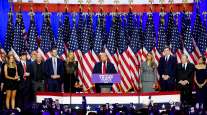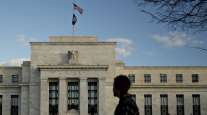Trade Fight Expected to Add Risk but Not Sink US Economy

The latest tariff salvos between the United States and China have brought a trade war closer to reality. It’s a risk that the world’s biggest economy is well-positioned to ride out.
China on April 3 said it would impose an additional 25% levy on around $50 billion of U.S. imports including soybeans, automobiles, chemicals and aircraft, in retaliation for a host of tariffs proposed hours earlier by President Donald Trump’s administration.
For those monitoring the effect of the developments on the U.S. economy, trade remains more of a risk rather than a major setback, with growth still projected to pick up this year amid a robust labor market and rising consumer and business spending. That, along with the possibility that the nations will work out their differences before the latest tariffs go into effect, is keeping analysts from rushing to cut their U.S. growth estimates.
RELATED: China’s counterpunch to Trump’s tariffs sparks global selloff
“In the short term, the proposed tariffs will have limited impact to growth,” said Christophe Barraud, chief economist at Market Securities in Paris. “At this point, it’s more about sending a signal than a blow to U.S. and global growth.”
Barraud — ranked by Bloomberg News as the top forecaster of the U.S. economy for three years — estimated that if all proposed U.S. and Chinese tariffs are implemented on all listed products, annual U.S. growth would take a hit of 0.1 to 0.2 percentage point.
RELATED: Dow drops more than 400 points after being down 700 as trade-war fears intensify
He’s not changing his long-term U.S. forecast or expectations for 2.6% growth this year, but could revise it if a drop in optimism among businesses and consumers results in less investment and spending. He said it’s more likely that the tariff proposals are a first draft and both countries will negotiate exemptions and changes.
U.S. Federal Reserve officials also are taking a wait-and-see approach to the specter of a broader trade conflict.
Bullard, Brainard
St. Louis Fed President James Bullard said April 4 that the escalating U.S.-China trade dispute increases uncertainty around the outlook, but he would see how negotiations play out before adjusting his economic forecasts. He said the end result may yet be a better trade relationship for U.S. businesses.
Fed Governor Lael Brainard, speaking in New York on April 3, called the topic “a material uncertainty in the outlook” while saying that gradual interest-rate hikes still are warranted.
Other economists saw little effect on the U.S. outlook, while pointing out that this remains a developing story.
RELATED: Trump’s trade war and the $470 billion hit to the global economy
“The aggregate impact remains negligible” as reflected in the lack of response in the Treasury market, according to Carl Riccadonna and Yelena Shulyatyeva of Bloomberg Economics. “The economy is well-suited to endure these minor frictions, given the robust state of the labor market.”
To put it into perspective, they said, a 25% tariff on $50 billion of products would total about $13 billion, which is the economic equivalent of a 13-cent increase in gasoline prices. The tariffs don’t materially change the outlook for Fed policy, as a price shock on particular products will be treated no differently than oil price shocks in recent decades, they said.
To be sure, it’s hard to ignore the various possible negative outcomes.
Among them is a hit to certain exporters, such as farmers and aircraft maker Boeing Co. If tariffs result in higher prices then manufacturers will feel pain, some of which is showing up already in recent reports after earlier fees on steel and aluminum imports.
Consumer Sentiment
On top of that, the uncertainty and stock market declines could hurt sentiment, which could weigh on consumer spending just as the tax cuts were starting to help boost Americans’ pocketbooks.
If the trade actions persist with further retaliation, “and it also ripples through the financial markets, then we have a whole different ballgame,” Michelle Meyer, head of U.S. economics at Bank of America Corp., said April 4 on Bloomberg Radio. She said the tariffs put into effect so far will have relatively small effects on economic growth and prices.
Mickey Levy, chief economist for the Americas at Berenberg Capital Markets in New York, put a very low probability on a disruptive trade war, calling it “an overblown risk,” and arguing that “Trump’s disorderly and disruptive negotiating tactics are likely to reduce trade barriers.”
At the same time, the strategy carries a cost: Heightened uncertainties and financial-market volatility may hurt confidence and limit economic performance, Levy wrote, adding that more conventional multinational trade agreements would deliver better results than tariff threats.
With assistance by Christopher Condon




